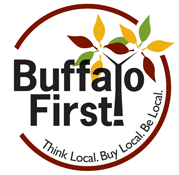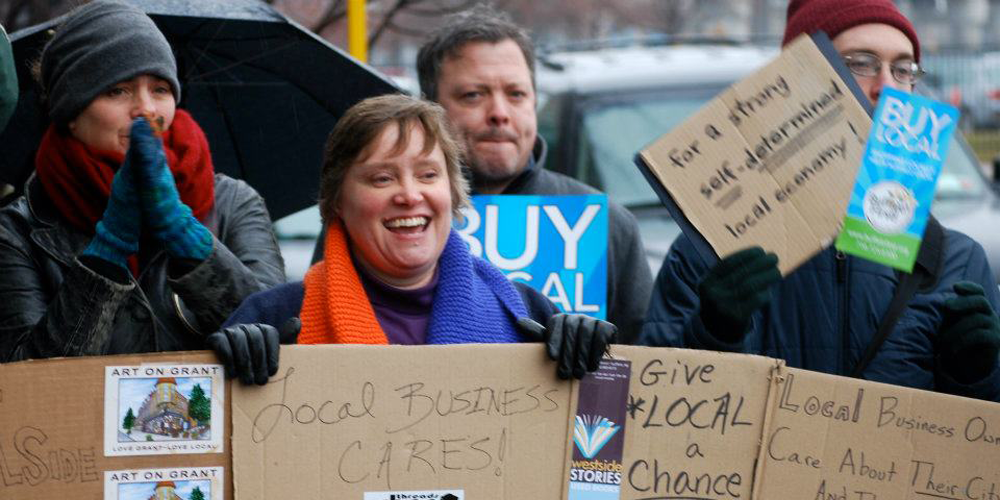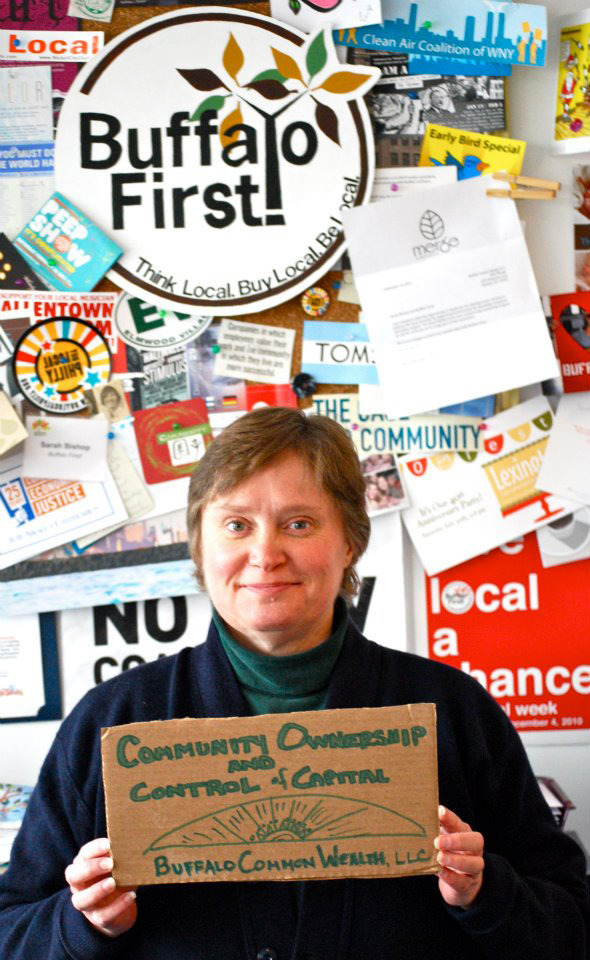News
Remembering Kelly MaurerNovember 03, 2016
In October, longtime Buffalo First board member and champion of cooperative, locally owned, and community controlled enterprises, Kelly Maurer, passed away. Along with Kelly's many friends, family, and colleagues, Buffalo First pauses to remember her innumerable contributions to our community. Buffalo First's founding executive director Amy Kedron shares her remembrance below. ---- Kelly got it: she not only understood the organization's mission, she lived itKelly Maurer was committed to Buffalo First, literally from the first week it launched. I met her back in 2006 when I was a graduate student embarking on an unconventional research project: to start a social enterprise that works to build a local, green and fair economy in Buffalo, NY. Kelly, who helped run the Buffalo Cooperative Federal Credit Union, was one of the first ten enterprise leaders that I met with in an attempt to pitch the idea of Buffalo First and ask for a $50 member donation. Immediately, Kelly stood out. There was no pitch, no hard sell-she got it: she not only understood the organization's mission, she lived it. Instead of giving $50 she donated substantially more and it became an immediate gale for humble sails. While large local donors have often asked "What's in it for me?" before giving to Buffalo First, Kelly's question with any endeavor was "What's in it for us?" Within a year, Kelly became a member of Buffalo First's board of directors. Each member of a board is chosen because they have a few key skills to share. Kelly had not a few, not many, but any. If there was a need that she did not know how to fulfill she studied and mastered it. Soon I saw her carrying around a book on organizational budgets; she assumed the role of treasurer and quickly worked on building a financial plan for Buffalo First. Kelly did not want to see Buffalonians just get by, she wanted them to thrive and she had a keen understanding of the pivotal role cooperative resources played in this. Working at the credit union, Kelly prided herself on knowing eighty percent of its members. They were more than members. To Kelly, they were her neighbors, and she would spend nearly an hour with each new member, listening to their unique needs, explaining financial mumbo-jumbo and then building a financial plan just for them. She devoted half of her workday to simply listening to and valuing people as something more than clients or consumers. Kelly regularly did her own homework and would quietly open accounts with the Co-op's greatest competition-the banks. She said they spend about ten minutes with newcomers and specialize in hidden fees and fine print. Kelly saw credit unions as a corrective antidote to this predatory behavior. When Kelly expressed herself, she exuded the righteous indignation of post-industrial Buffalo. She knew what it had been through and what it could be. As Buffalo First's board chair Andrew Delmonte recently remarked, she never shied away from calling people out on their bullshit. Buffalo First was not spared from Kelly's tough love. Where board members like Tim Herzog would bring beer to our board meetings, Kelly fortified meetings with stinging doses of her telling it like it is. While the suds ensured needed levity and got bodies into seats, it was swallowing Kelly's raw honesty, which ensured that Buffalo First's decisions were practical and enduring. I would joke with Kelly that her sense of humor, at times, channeled the frustrated rage of comedian Sam Kinison. When she spoke of an issue that struck her passion she would nearly pop. Like Kinison, she was hilarious. Board member, and Kelly's close friend, Sanjay Connare recalls a time when they were in a staid break-out session at an important national conference. They took one look at each other and found themselves in a fit of "the giggles" that almost got them kicked out. This is just one of the ways Kelly beautifully channeled the fire inside her.
Kelly assumed the necessary leadership in Buffalo First on several occasions. Back in 2010, for example, after I had worked with Kelly and Buffalo First for four years, it was time for me to leave the field and write my PhD dissertation based on my work there. But we needed a secretive transition. We had spent two exhausting years applying for a major grant and knew the foundation would not release funds to an organization with no executive director. I confided in Kelly about my departure and she quietly worked to ensure a seamless changeover. As a result, we got the grant and the organization soared when it could have stalled. We all have busy lives and while directors, members, and staff have come and gone through Buffalo First, Kelly maintained a consistent presence. Days ago, from her hospital bed, she met with Sanjay to discuss an exciting new project. She told him how she could not wait to get out and work on it. Even at a time when she should have been thinking of herself, she was thinking, instead, of what could be for the city and people she loved. As Steve, Sanjay, and I planned to write this testament to her, Steve insisted that if Kelly knew that we were honoring her, she would be embarrassed and ask us to turn the spotlight on what it was that she did. When I left Buffalo First, the second phase of my research on Buffalo's local entrepreneurs began. I had worked with hundreds through the organization and selected a few dozen to interview at length. Kelly easily made the cut and shared sage commentary. What Kelly discussed during that interview was not herself but her driving force: the collective power of community. She believed in the ideals of a vibrant locally-based community and was dedicated to doing the work necessary to realize that dreamI wanted to share a few segments of our interview so that we can remember Kelly and understand her passions, best, in her own words. She leaves us with important lessons that can help guide Buffalo's populist growth. An essential measurement of community power is a topic Kelly thought about all the time and some of us avoid at all costs: money. She said, "Money really equates with your ability to do stuff, and who controls the money controls the power in a community-the ability to get things done." This is why Kelly was passionate about the cooperative control of resources. Cooperatives, according to Kelly, "Take the wealth of the community and cooperatively and democratically decide how that money should be invested and directed and managed-which is the real crux of the thing... it's about everybody in the community. You pool the savings and then do wealth-building in the community." While Kelly's philanthropic reach helped build initiatives such as Urban Roots, Five Points Bakery and Farmer Pirates, she understood that the true lynchpin of community wealth building was credit unions. "The credit union," she said, "is about regular people. Not people with MBAs, financiers or financial wizards-they're just regular people living regular lives giving them a kind of safe and comfortable place to conduct their financial business, where they can ask questions like 'How do I reconcile my account? What does that mean?' And they can get advice and guidance and support in conducting their financial affairs, which is kind-of the bedrock of everything.... That's the difference between [a credit union and] a multinational corporation because [corporations] are doing work for their shareholders and that's their legal duty." Kelly believed that the most important part of community development is us-the community. Kelly did not pursue the spotlight partly because she believed all members of a community played a part in the orchestra of change. Regarding the projects she invested in she said, "We all put our energy into something and I suppose if I hadn't done it somebody else would have. And I'm certainly not the only person-we all, at various points, take on something and carry it for a while and then hand it off and somebody else takes it." It is now our turn. As we reflect on Kelly Maurer and the significance of her work, she would want us to be mindful of our own value as a part of the living-breathing organism of community development. She would want all the great initiatives that have emerged in Buffalo to flourish. She shared a goal that we should work toward: "You want to have a lot of vibrant living organizations, that will come and go, but there's enough of them, that the loss of any one of them isn't devastating. And that diversity of character creates a beautiful fabric instead of a really boring monoculture." according to Kelly, "Take the wealth of the community and cooperatively and democratically decide how that money should be invested and directed and managed. Which is the real crux of the thing...it's about everybody in the community, you pool the savings and then do wealth-building in the community." Kelly would want us to keep Buffalo's post-industrial fire burning and keep yearning for something more-to keep asking "What's in it for us." She said it all begins when "a group of people get together and say 'Man, we need this,' and then they collectively do it. The individual businesses may come and go, thrive or fail, but it's that impulse that we need to nurture for people. It's in the striving. It's a process, not the product and as long as people are aware that they have the power and the direct ability to participate, the actual names of the businesses don't matter and I think that's part of the vibrancy when we talk about the character of Main Street. It's like a human population: people are born, they grow up, they learn, they change, they mature and eventually they die. And that's the natural way of things in a human community-it's vibrant and if one person dies it's a loss and we mourn, but somebody else is born and it's a big mix, and it's the same thing when you have a lot of vibrant local businesses whether they're credit unions, co-ops, mom and pops-whatever they are. They have their lifecycle, sometimes it goes through generations, but there is a lifecycle nonetheless." Thank you, Kelly, for all that you've done to breathe life into that lifecycle. Let's honor her and keep it moving. Amy Kedron is the founder and former executive director of Buffalo First.
|


 Regarding her style of leadership, Kelly's close friend and past Buffalo First board member Steve Lane has said, "Every Don Quixote needs a Sancho Panza, a person that supports and cares for the vision. Kelly epitomized what it was to support the dream. She believed in the ideals of a vibrant locally-based community and was dedicated to doing the work necessary to realize that dream. Kelly didn't lead the charge at windmills; she fed and supported those who did. Kelly did not seek to be recognized or singled out; she was never comfortable when she had to lead the charge but she would do it when necessary." Buffalo First is a testament to this.
Regarding her style of leadership, Kelly's close friend and past Buffalo First board member Steve Lane has said, "Every Don Quixote needs a Sancho Panza, a person that supports and cares for the vision. Kelly epitomized what it was to support the dream. She believed in the ideals of a vibrant locally-based community and was dedicated to doing the work necessary to realize that dream. Kelly didn't lead the charge at windmills; she fed and supported those who did. Kelly did not seek to be recognized or singled out; she was never comfortable when she had to lead the charge but she would do it when necessary." Buffalo First is a testament to this.